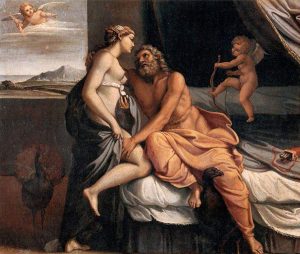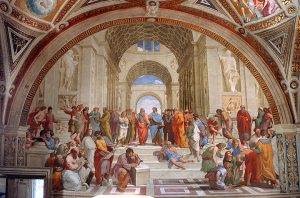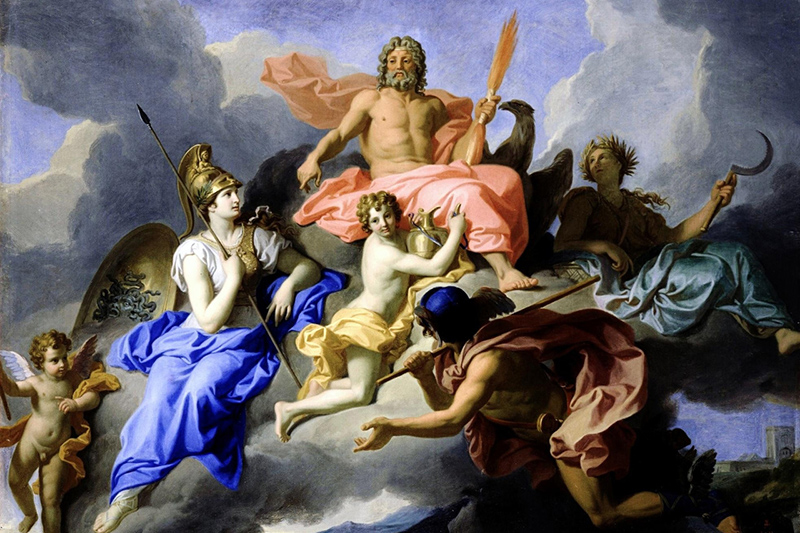In the plane of the Physical Cosmology, there is a wide range of concepts, processes and evidence that support the most widely accepted theory today, the Big Bang. However, there are other models that have attempted to describe the Universe and its origin over time, based on scientific and other arguments. Other models of physical cosmology will not be emphasized (it is enough to mention those cited in the article «How did the universe origin?«, theories of Pulsating Universe and Stationary state), so only cosmologies from other perspectives are mentioned.
mythological cosmology

Mythology is aimed at describing the origin of the Universe and the functioning of nature. They are based on legends that are generally associated with deities, idols, beings with superhuman powers who are on another plane of reality, and based on whose decisions the destiny of men is governed. Historically, a large number of ancient cultures are recognized with their own mythology, such as the Greek, Babylonian, Chinese, Hindu, pre-Columbian or Andean. The legends associated with gods, such as Zeus in the Greeks, the sun bird in the Shang dynasty, the compendium of the Mahabharata in Hindu culture, the Arab geniuses or the deities that demanded sacrifices in pre-Columbian cultures, all of them represent in some way the creation of the Universe or the World, as well as everything that human beings have in their daily lives (vegetation, oceans, mountains, Sun, Moon, etc.).
Ancient mythology has set precedents in our society in gadgets that we use today, such as the calendar, where the same days of the week are somehow associated with a mythological deity. Not all mythologies are associated with a particular religion, but their function is to explain phenomena that could not be understood with the knowledge of that time. Such was the case of the good heavens, which in Greek mythology were sent by Zeus from heaven, or the rainbow, which in Chinese mythology is associated with the deity Ñüwa, who would have sealed the sky using stones of seven colors.
philosophical cosmology

Ancient Greece had many characters who tried to describe their environment based on the philosophy of the time. This came down to the mention of a principle (arch) of everything that exists. However, this philosophical desire should not be understood as seeking to understand the origin of the Universe, since it was seen as something that already existed as a starting point and from which everything else would be generated. Philosophy tried to overcome mythological explanations of nature, referring to real elements to explain nature. Then we have as an example that for Anaximenes, the natural principle of the entire Universe is the air, While for Tales of Miletus It was him water, and to Heraclitus he was fire. The group of philosophers who attempted to describe the basic principles of nature were the pre-socratics.
Philosophy can be understood as a step from myth (where arbitrariness and chaos prevail) to logos (where reason and the cosmos prevail). This implies that in philosophy the effort was dedicated to explaining things through reason and logic, setting the precedent for the establishment of scientific thought. In other philosophies, such as Hindu or Chinese, they are usually founded on religious and mythological motivations. Chinese philosophy, for example, imposes that destiny was something manipulable by great deities, while Hindu currents are governed by mysticism and are rather dedicated to giving meaning to the lives of people in communion with the world.
religious cosmology
 Historically, the development of science has been positioned as antagonistic to religion, as it has demonstrated as erroneous some assumptions on which many of them are based. The best known cases are found in the Islam and the Christianity, whose sacred texts (the Koran and the Bible, respectively) account for God's position in front of the Universe. While the Quran places God beyond any human accessibility and gives him the status of creator of all things, in addition to sustaining, directing and judging him; while the Bible recounts in detail the process of creation in the book of the Genesis, where it is described how this deity would have created the Universe, the World and the Human being.
Historically, the development of science has been positioned as antagonistic to religion, as it has demonstrated as erroneous some assumptions on which many of them are based. The best known cases are found in the Islam and the Christianity, whose sacred texts (the Koran and the Bible, respectively) account for God's position in front of the Universe. While the Quran places God beyond any human accessibility and gives him the status of creator of all things, in addition to sustaining, directing and judging him; while the Bible recounts in detail the process of creation in the book of the Genesis, where it is described how this deity would have created the Universe, the World and the Human being.
Science has been gradually dismantling (without intending to do so, of course) what was formerly considered factual and real facts, based on Sacred Scriptures. One of the greatest examples is the arrival of the Heliocentric theory, which stripped the Earth of its status as the center of the Universe, or the Theory of Evolution, which ended up collapsing the Creationism of the human species. Although scientific discoveries have served to increase our knowledge of the origin of the Universe, religious cosmology is the only one that continues to show followers (who do not accept scientific theories in this regard), since religion itself is a field of beliefs that never I would conceive that its greatest reference (God) has not had a Creative role.


